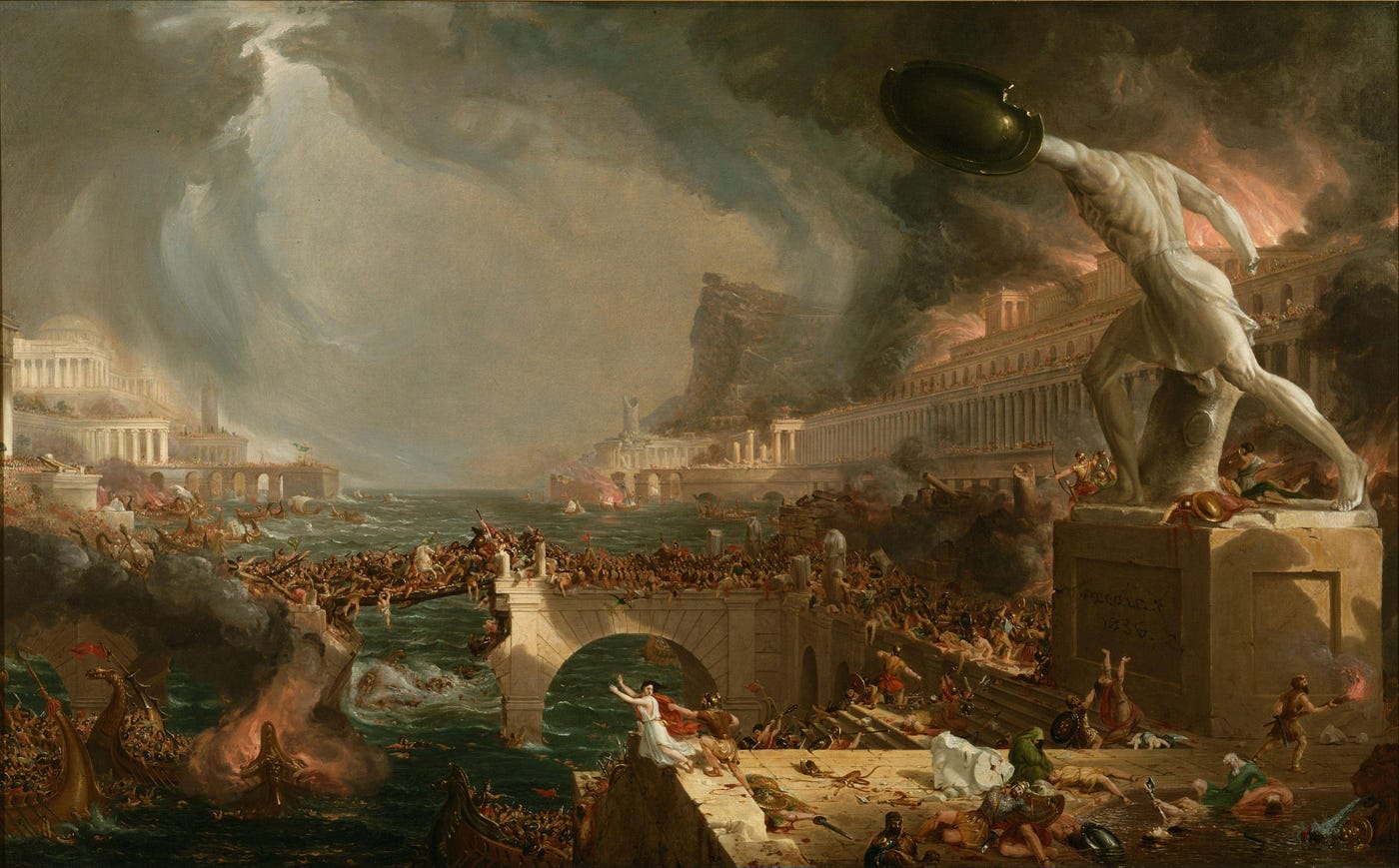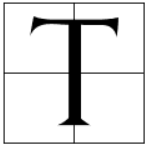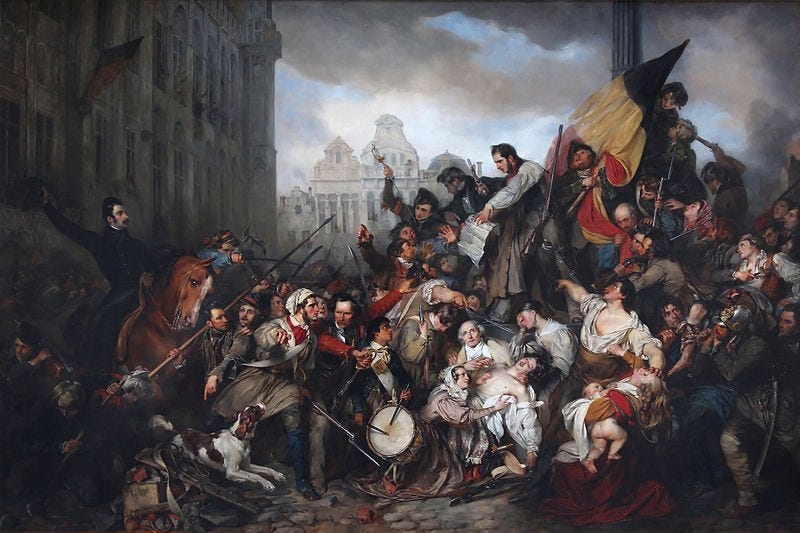What Are Some Ways The Renaissance Change Society Politically
The Renaissance: Cultural & Political Impact on European Nation-State Building
"Cognition of the by and of the places of the world is the decoration and nutrient of the listen of man." — Leonardo da Vinci

 T he objective of this brief commodity is to nowadays ane's perspective regarding the renaissance and its bear on on European nation country building in a variety of dynamics. This shall be done through a cursory review of the historical and religious context of the Mediterranean earth prior to the renaissance and the primal elements of the gimmicky secular and religious separation, followed by a short cess of both the cultural and political developments that followed in the gradual development of democratic nation-states in Europe.
T he objective of this brief commodity is to nowadays ane's perspective regarding the renaissance and its bear on on European nation country building in a variety of dynamics. This shall be done through a cursory review of the historical and religious context of the Mediterranean earth prior to the renaissance and the primal elements of the gimmicky secular and religious separation, followed by a short cess of both the cultural and political developments that followed in the gradual development of democratic nation-states in Europe.
As noted past Bollack, fifty-fifty during the time of Sophocles' Antigone, literature served as an expression of "political, social, and intellectual aporia". However, post-obit the introduction of Christianity on the European stage with Roman Emperor Constantine'southward conversion in the 4th century Advert, religion before long became an increasingly prominent cistron in world literature (with respect to the contemporary known European earth). Over the following centuries, Christianity immune literature to stray from the classical traditions and be replaced by a strong focus on ecclesiastical writings and the express production of bibles alongside other scriptures in Latin (most typically) — a language non truly understood by the citizenry and therefore express interpretation and individualism (to be discussed later).
As a result, religion became increasingly intertwined with politics, with "advisors" to monarchs beingness men of organized religion and monarchs themselves existence legitimised through the 'divine correct of kings', as highlighted by Charlemagne, the first 'Holy Roman Emperor'. Furthermore, educational activity was provided through religious institutions and only to the nobility, who later become religious or political leaders. Such an accumulation led to the renaissance (or 're-birth') from the 15th to 17th centuries following various factors, but one would debate a core influence was the rediscovery of classical works and the introduction of 'vernacular literature' which facilitated the blossoming of modernistic languages such equally Italian, Spanish and English. Aslope the latter, was the development of principles that would afterward serve as a foundational building block for modern nations soon prior to the industrial revolution; humanism, secularism, individualism and scepticism.
Both secularism and humanism allowed a citizenry to place true value on the life of their own species as opposed to a mentality of indentured servitude to the Christian God, therefore embodying the spirit of pursuing the present, through dreams of avarice for example, highlighted past the renaissance realisation that currency and finance was to exist understood every bit a science, embodied by the Medici family's rise to prominence, in dissimilarity to its previously sinful connotations following the widely taught story of Jesus turning the tables of the "den of thieves" in Jerusalem (Matthew 21:12–13).
Scepticism was the embodiment of a questioning mental attitude, not in cynical fashion, but simply to nowadays an interest in various diplomacy that either directly or indirectly affect every day man life. This was highly significant to the foundations of democratic nation states in the coming centuries. For a millennium, the European citizenry was taught to follow, non question and simply have faith in their religious leaders both on a national and international scale, to guide 'the flock' selflessly — therefore the separation of secular from religious was revolutionary every bit religion was intertwined with politics. One can attribute such values to the works of both Martin Luther and Erasmus. Democratic understanding that followed the renaissance era and remains embodied in modern society, encourages the citizenry to question its leadership (both secular and religious) in order to maintain accountability and responsibility. The same is additionally a key characteristic of individualism, empowering the pursuit of individual thought and ideas to contribute to guild — i.e. by Karl Marx and his criticisms of European Capitalism in its youth.
The newfound admission to education and understanding of a modernising globe facilitated progression on a profound scale through the pursuit of a shared historical, linguistic and cultural heritage that was now separate to the religious society in which the European citizenry previously lived. Granted, conservative Christian values still remained prominent in politics for centuries to follow and remain arguably significant to date in sure political spheres. The conception of the modern nation therefore before long became a reflection of the pursuit of a common nationality.

As mentioned in previous works, the nation is argued to be the 'myth that congenital the mod nation' as indeed information technology is cogitating of a fluid mythology more than specific guidelines engraved in stone. This process is historically centred around the industrial revolution due to its catalysation of mass-migration from rural areas to ever-expanding cities. This allowed civilisation to form by various means but communicated through the utilize of a mutual colloquial provided by the similarly entitled new-moving ridge literary tradition of the renaissance. Additionally, regarding the press press of the centre-ages and its use to industry revolutionary citizenry-uniting works such as Luther's 95 Theses, the similar product of newspapers in the post-obit centuries, that were widely accessible promoted an increasingly communal sense of agreement and reliance, facilitating interconnectedness. The points previously discussed then led to state of war condign synonymous with the protection of a commonly shared identity and consequently legitimate sovereignty within the territory the nation-country has claimed. As a result, such a struggle against rival nation-states, hegemonic or secondary, reinforces the vitality of nationalism and its integral significance. Such an understanding was a core principal of international relations and strange policy prior to the conclusion of the Common cold State of war and the following wave of globalisation and transnationalism on an unprecedented scale.
To follow the conclusion of Renan as a ways of reinforcing 1's ain, the entirety of this analysis, specifically regarding the post-renaissance values that legitimised the modern nation, "so long every bit this moral consciousness gives proof of its strength by the sacrifices which demand the abdication of the private to the advantage of the community […] If doubts arise regarding its frontiers, consult the populations in the areas under dispute. They undoubtedly accept the correct to a say in the matter". In short, said values and legitimisation of both the nation-country and consequential nationality are only as useful as they are productive in societal progression. Should such a system therefore be corrupted and contradictory of the citizenry'due south wishes, then a re-evaluation should be encouraged, and conclusions presented regarding how to further develop ourselves in the modern historic period through accurate historical reflection in safeguarding culture. Finally, one would argue that the renaissance itself held meaning touch on in a wide diversity of socio-political and cultural spheres both contemporarily and in the centuries to follow during the era of industrialisation.
Disclaimer: This article was originally submitted and graded as a university paper at Universitat Pompeu Fabra (UPF), and has since been edited for publication on the Medium platform.
References:
BOLLACK, Jean. «From Philology to Theatre. The construction of Meaning in Sophocles' Antigone». The Fine art of Reading. From Homer to Paul Celan. Translated past Christoph Koenig, Susan Tarrow, Bruce Rex. Washington: Centre for Hellenic Studies, 2016, 129–136.
RENAN, Ernst. «What is a Nation?» BHABHA, Homi K. (ed). Nation and Narration. Translated by Martin Tom. London: Routledge, 1990, 8–22.
Penrose, J. & C.M. Mole, R. (2008). Nation-states and national identity. In K. R. CoxM. Low & J. Robinson The SAGE handbook of political geography (pp. 271–284). London: SAGE Publications Ltd doi: 10.4135/9781848607880.n17
Haywood, Eastward., & Rossi, P. (1993). HUMANISM AND THE RENAISSANCE. The Year'due south Work in Modern Linguistic communication Studies, 55, 533–563. Retrieved June 17, 2020, from world wide web.jstor.org/stable/25832967
Kristeller, P. (1947). The Philosophy of Man in the Italian Renaissance. Italica, 24(2), 93–112. doi:10.2307/476554
DUPRÉ, L. (2004). The Enlightenment and the Intellectual Foundations of Modernistic Civilization. New Oasis; London: Yale Academy Printing. Retrieved June eighteen, 2020, from www.jstor.org/stable/j.ctt1npfbd

Source: https://historyofyesterday.com/the-renaissance-cultural-political-impact-on-european-nation-state-building-e78a564df44
Posted by: lundwors1974.blogspot.com

0 Response to "What Are Some Ways The Renaissance Change Society Politically"
Post a Comment